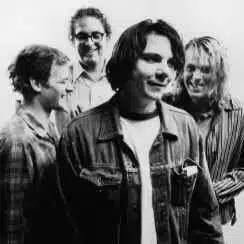
Jeff Tweedy does not talk politics. At least he didn’t during Wilco’s performance at Towson’s Recher Theatre, not even as the band opened their set with 45 minutes of music from Mermaid Avenue, the two-volume collection of unfinished Woody Guthrie songs that Tweedy and co-collaborator Billy Bragg put to music. Given Guthrie’s cult status as an engaging, guitar-wielding populist who fought fascism with a folk guitar, and the cantankerous, leftist politics of Bragg, one might expect Tweedy to poke into the political arena, especially being so close to Washington, D.C. on this particular night. But Tweedy was speechless as he guided Wilco through Mermaid Avenue highlights like “California Stars,” “Blood of the Lamb” and “Christ for President.” Armed with an acoustic guitar and an assortment of harmonies from guitarist Jay Bennett and bassist John Sirratt, Tweedy matched Guthrie’s words to raspy vocal phrasings that aptly recalled Bob Dylan, a folk singer whose debt to Guthrie is unmistakable. Indeed, as Tweedy strained for the high notes on “Airline to Heaven,” the Dylan resemblance was almost uncanny, if not a bit eerie. But even Dylan went electric, and so too did Tweedy for the Wilco material that formed the second half of the set. A rejuvenated audience eagerly embraced the opening bars of “Red Eyed and Blue,” even cheering Tweedy’s failed attempt to whistle the final melody. Wilco then wandered through selections from disc one of 1996’s Being There, and 1999’s Summerteeth, casting aside their 1995 debut, A.M., save for a rousing version of “Casino Queen” during the encore. The selections from Summerteeth, an album both heralded and chided for Tweedy’s experiment with postmodern British pop, proved most interesting live. From a studio perspective, it was more than the Beatles and Brian Wilson influences that made Summerteeth such a curious effort. It was that Tweedy’s previous work welding country, blues, and bar rock together had made him a pioneer of the “alt-country” movement, a clubby genre that regaled the re-introduction of American country music into pop culture. The masculine, traditional country of Acuff-Rose, with all its literal realism, could not be a further departure from the airy atmospherics of the British 4AD bands, with all their gluttonous multi-tracked affectations. But Tweedy not only dared to bridge that gap on Summerteeth, he fused the two genres famously, and without any apologies to the alt-country purists. On stage, however, the studio side of Summerteeth gave way to pangs of rockism. There was the cranky blues guitar lead on “I’m Always in Love,” the heavy prog-rock nod on “A Shot in the Arm,” and the stripped-down simple folk strains of “She’s a Jar.” The added guitar muscle to the Summerteeth songs allowed them to sit seamlessly alongside Being There staples such as “Hotel Arizona” and “Misunderstood,” the latter song appropriately serving as the closer with its moody, cinematic climax. Wilco has no commercial hit. But they boast a loyal live following bred on the strength and consistency of their recorded material. Freed from having to render obligatory performances of songs deigned “popular” by corporate radio, Wilco has the luxury to cull from all corners of its catalogue for its live shows, comforted in knowing that almost every song will generate its share of cheers. After all, who knew that “Forget the Flowers” would trigger such satisfaction from the crowd during the encore, or that the omission of “Box Full of Letters,” “Can’t Stand It,” or “Via Chicago,” would not even be realized until the ride home. Viewed this way, Wilco may be the closest thing to a vintage album rock band today, where, at least in theory, every song is equally deserving of exposure. The same could be said about R.E.M. in the mid-eighties, another band who, like Wilco, created music steeped in regional ruralism, and whose fans ingested their albums whole cloth, rather than single by single. At times, Wilco overindulge themselves in the tawdry guitar excesses of ’70s rock. But watching the band perspire through “Casino Queen,” segue into a Who riff, and then rip through “Outtasite (Outta Mind),” a song Paul Westerberg must wish he had written, you couldn’t help but revel in the notion that there was no room on stage for politics.
